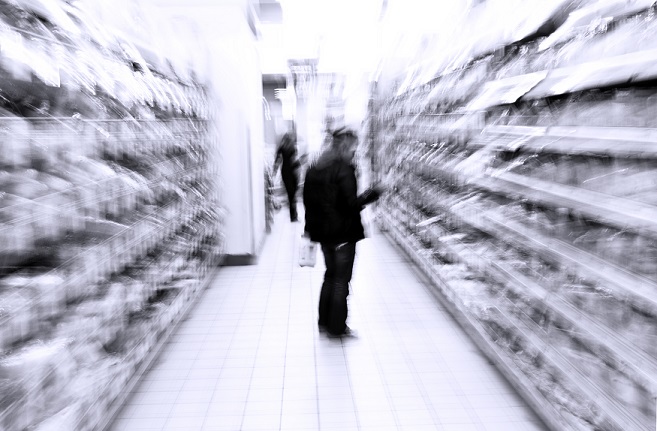Late last year, seemingly out of nowhere, anxiety found me. It gripped me with its dull, malevolent claws, and, so far, hasn’t yet let go. It wasn’t Uni stress, it wasn’t a personal issue. To this day, I can’t pinpoint why it emerged or where it came from. There’s been no depression connected to it, thankfully. All I could do was try to make it bearable – something I haven’t yet succeeded in, but have attempted.
Having anxiety at Uni can be a real struggle. Fear of it surfacing can lead to you being a total recluse, with ‘home’ fast becoming a relatively safe space. Consequently, it’s so easy to drop off the social radar; invitations out are turned down with wishy-washy excuses, friendships slowly slip, and you cling to the only space where the fog settles. It’s a constant battle: do I go out, knowing that I’ll be awful company, feel anxious to the extent of near-vomiting, and appear rude when I can’t sustain a conversation – or do I stay home, seemingly taking care of myself but then missing out and not ‘pushing’ myself?
It can come on suddenly, anywhere. There’s no reason to be in the Eddy B Café and suddenly feel hot, flushed, shaky, and panicked, but it can and will still happen anyway. Or you’re at Terrace having drinks, wondering how to explain your weird behaviour to your friends who want to know why you keep going to the toilet every 20 minutes – how can you possibly explain that you keep thinking you need to throw up but the nausea is all in your head? I could be talking to someone and be so aware of anxiety squeezing me, as I just watch the other person’s mouth move and their words wash over me and I have to abruptly excuse myself. An English seminar leader said that “deciding for yourself that you have (he then effected quotation marks with his hands) “anxiety” is not an excuse not to show up.” This discourse will only contribute to the guilt blaming that builds up upon anxiety sufferers who are acutely aware that they are ruining their own lives, becoming slowly more and more debilitated in their everyday lives. Unfortunately, because anxiety is so common, his opinion is one shared by many.
Coupled with my anxiety is my derealisation, which the NHS describes as “seeing other people and the environment around you as dream-like and unreal. Objects may change in shape, size or colour. Typical symptoms are feeling like a normal environment is unfamiliar; a sense that what is happening is unreal; feeling detached from the world”.
I can only describe my derealisation as some sort of sensory fog. I can see perfectly well, but my vision is blurred. Patterns swim before my eyes, disorienting me. If I’m out, voices swirl like some sort of pre-recorded sound effect but I can’t single out sole voices, making me feel wrapped in a whirling wall of intimidating noise. When I become aware of this, anxiety washes over me; feeling non-present is terrifying, realising that you’re in a group but haven’t spoken or moved or been listening for 15 minutes is terrifying. Derealisation also drastically affects processing information and focus, making work extremely difficult. I’ve found so often that I’ve been reading an article and suddenly realised that I don’t even know what I’m reading, that I haven’t been withdrawing any information, sometimes after ‘reading’ over ten pages, sometimes even needing to check the title.
You can’t just pinpoint it, analyse it, and move forward. It’s not that simple. Well, maybe it is for some, but with it being as random and causeless as mine, where I feel like there is something inside me that I cannot control, coping seeming to be the only option that I can offer to myself and others.
Personally, my anxiety is worsened with certain stimulants : cannabis, which for me engenders paranoia and disorientation, and caffeine, which can make me shaky and panicked. Alcohol tends not to be my friend either – though I largely think this is because I associate it with environments that my anxiety thrives in, such as bars.
Cooling down is important. My anxiety manifests itself in a huge temperature rise on my neck and face, so fresh air and a cold drink help enormously; this is why I tend to avoid environments where I can’t ‘escape’ easily or discreetly. For club nights, I tend to scope out the venue to see how and where I can slip out for fresh air. In lecture theatres, being near the door and exit is also handy if you want to get out quickly and without attracting too much attention.
For me, my anxiety comes on no matter who I’m with, whether it be strangers, with my boyfriend, or on my own; no one person can ‘calm me down’, nor do breathing exercises have any effect. These things supposedly help with panic attacks though, which I do not suffer from. Ironically, I’m not an “anxious” person in many ways; I tend to never worry about exams, stress about deadlines or fret over finicky details. Anxiety as a disorder of the brain can be so far from the adjective that many know and experience.
Ultimately, all you can do is try and learn not to fear it; to recognise it and its existence, and try to not give in to its demanding cries. Pushing it into the smallest crevice in your brain and not paying it any attention, like putting a child on the naughty step. Learning what works for you as an individual, and, if need be, reaching out for the necessary and available help.
Anonymous.
(Image courtesy of: http://www.thepanicroom.co.uk/the-symptoms-of-anxiety/derealisation/)

